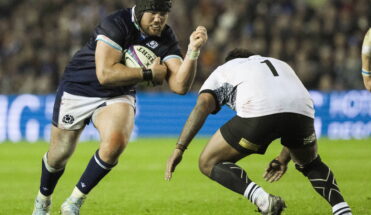Board Confirms Unanimous Support For Chief Executive
The Scottish Rugby Board today strongly refuted several serious allegations made in an article on the future of the pro teams, in yesterday’s Scotland on Sunday. The article included allegations by Mr Bob Carruthers, owner of Edinburgh Rugby Ltd and Mr Graham Burgess which, the Board believed, potentially called into question the integrity of its Chief Executive, Gordon McKie. The Scottish Rugby Board today strongly refuted several serious allegations made in an article on the future of the pro-teams, in yesterday’s Scotland on Sunday. The article included allegations by Mr Bob Carruthers, owner of Edinburgh Rugby Ltd and Mr Graham Burgess which, the Board believed, potentially called into question the integrity of its Chief Executive, Gordon McKie. The Board today confirmed its unanimous and full support for its Chief Executive, for carrying out the Board’s decision on this and all other matters. The Board also fully supported the Chief Executive in the handling of all expressions of interest made by third parties, in seeking to buy one of Scottish Rugby’s three pro teams, since Mr McKie took up his position in August 2005. The Board stated that before it was formed in July 2005, too many SRU decisions were taken on emotional grounds for the short-term and were not in the long-term best interests for the future health of the sport. This Board is not prepared to follow suit. Since making its pro-team announcement on 27 March, the Scottish Rugby Board has observed that the media coverage has been very varied and certain publications omitted or paid little credence to the salient points behind the Board’s decision. The wide-ranging review of professional rugby in Scotland began in January 2007 and was announced last week. The Board carefully considered how professional rugby in Scotland had performed since the sport went professional in 1995. It concluded that despite being successful in other rugby nations, it had not been successful in Scotland. The Board believed the main reason why Scottish teams in the last 12 years have not been consistently successful is because they have been grossly under-funded, relative to their opponents in other Northern Hemisphere countries. This has been demonstrated in areas such as the lack of player budgets, playing and training facilities, marketing and corporate support. The rugby public has not got behind pro-team rugby and attendances have been poor, compared to other home union countries. Recently it had become clear that some senior players have chosen to play outwith Scotland, as evidenced by the recent signings for next season. Over the last 12 years, the professional game has had to be subsidised from Scottish Rugby’s limited financial resources and a balance has had to be struck between how much support is given to the professional and the community games. To succeed in the professional game with the present number of clubs, the Board concluded there would need to be a significant injection of further funding. However Scottish Rugby is not in a position to divert funds from the community game, or other areas for which it has responsibility. These areas include coach education and development, performance development, strength and conditioning, women’s rugby and various age-grade initiatives. The Board therefore believed it must concentrate its resources and give one of its wholly-owned pro-teams a better chance of success. This decision will also help retain senior players and help attract non-Scottish players. Even the heavyweight European clubs such as Toulouse, Munster and Leicester Tigers augment their teams with experienced overseas players and in order to compete, Scottish professional clubs will have to do likewise. The Board fully believed under-funded teams will not assist in the retention and recruitment of quality players. From discussions with senior players it has become clear some are not relocating purely for financial reasons. Senior players in particular do not want to be associated with failure or mediocrity. They want to be part of a squad that has a chance to succeed on the field. They want to play with good quality players, in a modern, atmospheric stadium, with the benefit of good training facilities and be part of a set up that offers everything associated with a successful club. No Scottish team in the last decade can claim to have offered its players all these criteria. The Board concluded that at least one of its wholly-owned teams in Scotland should be afforded the opportunity to succeed. There were insufficient financial resources to give both Border Reivers and Glasgow Warriors such an opportunity. Rather than have two wholly-owned teams that will struggle and always be concerned about how a lack of funding may affect their long-term future, the Board concluded the right decision was to concentrate resources into the Glasgow Warriors. Some of the factors that assisted the Board in reaching this decision were the greater population base in the west of Scotland, the greater potential to attract crowds, the much stronger economic base and the greater opportunities to attract sponsorship and corporate hospitality. The Board confirmed its comments now relate entirely to Scottish Rugby’s two professional teams and not to Edinburgh Rugby, which is now owned by the Carruthers consortium.
Tags
Related news

Obituary: Peter Brown

Three of the best young players in Scotland bound for South Africa

Obituary: John Douglas

Teams confirmed for derby decider

‘World-class’ Schoeman pens long-term extension

Teams Confirmed for 1872 Cup Opener

Match Preview Glasgow Warriors v Edinburgh Rugby

Ventisei to captain Scotland U20 in friendly against Wales

Fagerson signs new multi-year deal with Glasgow Warriors





